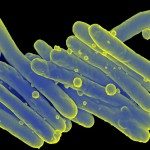Lien vers Pubmed [PMID] – 27846589
Science 2016 ;354 (6313): 702-703
Interactive link to article: http://science.sciencemag.org/content/354/6313/702
In 1873, the Norwegian doctor Armauer Hansen helped to lay the foundations of modern microbiology when he discovered that leprosy was an infectious disease, not an inherited condition. However, his attempts to cultivate the rod-shaped bacilli that he had observed in microscopic studies of tissues from leprosy patients were unsuccessful, emphasizing the unique growth requirements of these bacilli. Even today, Mycobacterium leprae, the causative organism of leprosy, cannot be grown on culture media, and many questions remain about its mode of transmission and epidemiology (1). The unexpected identification of red squirrels (Sciurus vulgaris) as an extant animal reservoir of leprosy bacilli by Avanzi et al. (2) on page 744 of this issue elucidates the host conditions that may allow leprosy bacilli to multiply and cause disease.

